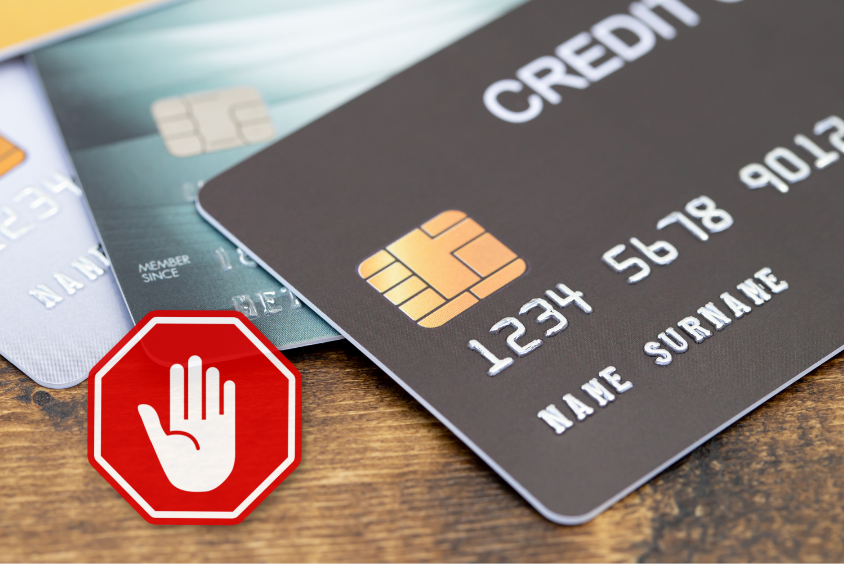Choosing a credit card can be a daunting task, particularly if you are a novice and are going to apply for your first credit card. If you are a regular reader of the Card Insider blog, you would already be aware that your choice of credit card should ideally depend upon your spend behavior- for example, if you are a frequent flyer, a co-branded travel credit card might be the best fit for you or if you love shopping online, an Amazon/Flipkart co-branded card might work for you the best.

However, there are certain red flags- some specifically for a particular category of cards, others applicable for all credit cards in general- that you must bear in mind before deciding on which credit card to apply for. You should refrain from applying for a credit card with one or more of these red flags-
High Annual Fee
While a hefty annual membership fee of a premium credit card is sometimes justified, it is usually advisable to stay away from credit cards with very high annual fees, especially when there is no spend-based waiver condition applicable for the card. This is because unless the monetary value of the benefit that you are availing from the credit card exceedes the card’s annual fee, there is no point of owning one. For a card with a very high annual fee, it is very much likely that you would not be able to avail the benefit worth more than the annual membership fee of the card.
High Interest Rate
If you are financially punctual and always pay off all your credit card dues on time, interest rate is a figure that is not even relevent to you for you have to pay the interest only if you are unable to clear all your dues by the payment due date. Still, since life is unpredictable and so are personal finances, one must be prepared for contingencies. Therefore, it is advisable to avoid credit cards with a very high interest rate on the due amount as there might be times when you are not abe to pay off your entire credit card bill due to financial crunches.
Low Reward Rate on Regular Spends
Some credit cards offer a high/accelerated reward rate on a particular category of spends and a low reward rate on normal spends (other retail spends). For example, a credit card may offer a very high reward rate on shopping from a particular merchant and a very low reward on all other transactions with the card. Now unless you shop from the card’s partner merchant very frequently, you should stay away from such a credit card as in most cases the card issuer would advertise the reward rate offered by the card on spends at the partner merchant, you would actually get a way lower reward rate on most of the transactions made with the card.
Low Credit Limit
This is another factor that you must consider while applying for a credit card. In most cases, the rule of thumb is that you should accept a credit card only if the card issuer is offering you a credit limit at least 3 to 4 times the amount that you think you would be spending every month. This is for two reasons-
- Your credit score (CIBIL score) might take a hit if you spend more than 30% to 40% of your credit limit. To keep your expenditure below 30% of your credit limit, it is necessary that your credit limit is at least 3 to 4 times your monthly spends.
- Many credit cards come with a spend based waiver condition under which the annual fee of your credit card is waived off on spending a certain minimum amount with the card in a year. In order to achieve the minimum spend requirement for the spend based waiver, you must spend a certain stipulated amount with the card in year. To be able to fulfill the waiver condition while at the same time maintaining a healthy credit score, you must have at least a decent credit limit.
Also Read: How To Get A Higher Limit On Your Credit Card?
Too Many Credit Cards
Having multiple lines of credit might seem attractive, applying too many credit card within a short span of time might reflect negatively on your credit report. This is because, every time you apply for a credit card, the card issuer requests your credit report along with your credit score from various credit bureaus such as CIBIL, Eperian, Equifax, etc. Frequent inquiries about your credit score/report from a credit bureau will have a negative impact on your credit profile.
Bottom Line
It is important that you keep the aforementioned five pointers in mind before applying for a credit card. For example, in most cases, you should avoid credit cards with a very high annual fee (the only exception is when you are sure that you would be able to avail the benefits worth more than the card’s annual fee). Another very common mistake that many first-time credit cardholders make is accepting a very low credit limit on the credit card. If you keep in mind the aforementioned points, you would be able to make the most out of your credit card(s).









